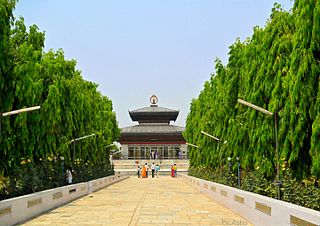Durga is a Hindu goddess.
Contents
Durga may also refer to:
Durga is a Hindu goddess.
Durga may also refer to:
Gupta is a common surname or last name of Indian origin. It is based on the Sanskrit word गोप्तृgoptṛ, which means 'guardian' or 'protector'. According to historian R. C. Majumdar, the surname Gupta was adopted by several different communities in northern and eastern India at different times.
Joshi is a surname used by the Brahmin (caste) in India and Nepal. Joshi is also sometimes spelled as Jyoshi. The name is derived from the Sanskrit word Jyotishi meaning "astrologer" or a person who practices jyotisha. Jyotisha refers to Hindu astrology and astronomy and is derived from jyotish.
Rajnandgaon is a city in Rajnandgaon District, in the state of Chhattisgarh, India. As of the 2011 census the population of the city was 163,122. Rajnandgaon district came into existence on 26 January 1973, as a result of the division of Durg district.
Kalyani may refer to:
Varmā, Verma, Varman, or Burman are surnames found in India and Southeast Asia. These surnames are commonly used by people of different castes and ethnic groups across the region. The surname is used in North India by some of the groups among cluster of castes called Kayasthas. However, in the same region along with Central India, it can also be found among castes like Lodhi rajputs, Prajapats, Kurmis and Koeris.
Das is a common last name in South Asia, among adherents of Hinduism and Sikhism, as well as those who converted to Islam or Christianity. It is a derived from the Sanskrit word Dasa meaning servant, devotee, or votary. "Das" may be inferred to be one who has surrendered to God. The surname is often used by those in the Vaishnav community.
Although India is a parliamentary democracy, the country's politics has become dynastic or with high level of nepotism, possibly due to the absence of party organizations, independent civil-society associations which mobilize support for a party, or centralized financing of elections. The dynastic phenomenon is present at the national, state, regional, and district level. The Nehru–Gandhi family has produced three Indian prime ministers, and family members have largely led the Congress party since 1978. The ruling Bharatiya Janata Party (BJP) also has several dynastic leaders. In addition to the major national parties, other national and regional parties such as Shiromani Akali Dal, Shiv Sena, Samajwadi Party, Rashtriya Janata Dal, Janata Dal Secular, Jharkhand Mukti Morcha, Dravida Munnetra Kazhagam, Kerala Congress, Jammu & Kashmir National Conference, Indian Union Muslim League, AIMIM, and the Nationalist Congress Party are all dominated by families, mostly those of the party founders.
Chaudhary is a common surname in the Indian subcontinent and Pakistan, originally derived from an Indian hereditary title. "Chaudhary" is a term adapted from the Sanskrit word caturdhara, literally "holder of four". 'Chaudhary' was first bestowed by the various rulers of the Delhi Sultanate, and the custom was continued by the breakaway Bengal Sultanate. Later, the Mughals and the Nawabs conferred the same title in great numbers. Chaudharies were "local magnates" responsible for land taxes alongside an amil and a karkun (accountant) in the local-level administrative units known as parganas.
Sahu is a surname found in India and Pakistan.

Mithila, also known as Tirhut, Tirabhukti and Mithilanchal is a geographical and cultural region of the Indian subcontinent bounded by the Mahananda River in the east, the Ganges in the south, the Gandaki River in the west and by the foothills of the Himalayas in the north. It comprises certain parts of Bihar and Jharkhand of India and adjoining districts of the Koshi Province, Bagmati Pradesh and Madhesh Province of Nepal. The native language in Mithila is Maithili, and its speakers are referred to as Maithils.

Karpoori Thakur was an Indian politician who served two terms as the 11th Chief Minister of Bihar, first from December 1970 to June 1971, and then from June 1977 to April 1979. He was popularly known as Jan Nayak. On 26 January 2024, he was posthumously awarded India's highest civilian honour, the Bharat Ratna, by the Government of India. This was announced by the President of India Draupadi Murmu on 23 January 2024.

The Garhwali people are an Indian ethnolinguistic group native to the Garhwal, in the Indian state of Uttarakhand, who speak Garhwali, an Indo-Aryan language.
Jyoti means "divine light" in many Indian languages.
Shukla is a word of Sanskrit origin that means "bright" or "white".
Rajendra Prasad Shukla (Hindi: राजेन्द्र प्रसाद शुक्ल, was an indian politician from the state of Madhya Pradesh and Chhattisgarh. He had been an M.L.A. to Madhya Pradesh Legislative Assembly several times, he was elected Speaker there in mid 1980s, as minister in early 1990s. Later after formation of Chhattisgarh, he was elected from Kota, Bilaspur to Chhattisgarh Legislative Assembly and became first Speaker of Chhattisgarh. Rajendra Prasad Shukla had been a prestigious leader for Kargi road Kota.

Chhedi Paswan is a former member of 16th Lok Sabha and a former member of Bihar Legislative Assembly. He represents the Bharatiya Janata Party (BJP) since 2014. At various points, he has been with Janata Party, then its Charan Singh faction, then the reunited Janata Dal, Bahujan Samaj Party, Nationalist Congress Party, Lalu Prasad Yadav's RJD and Nitish Kumar's JD(U).
Prasad is an Indian name, used both as a personal and family name.
Mohan is a given name and surname. Notable people with this name include:

Govindlal Vora was an Indian journalist, known for his contribution to Fearless journalism, literature, education and works in various social causes. He was founder editor of Hindi daily Amrit Sandesh. He also headed various trust and societies, in different fields of social welfare. He was active in journalism for 60 years in India.